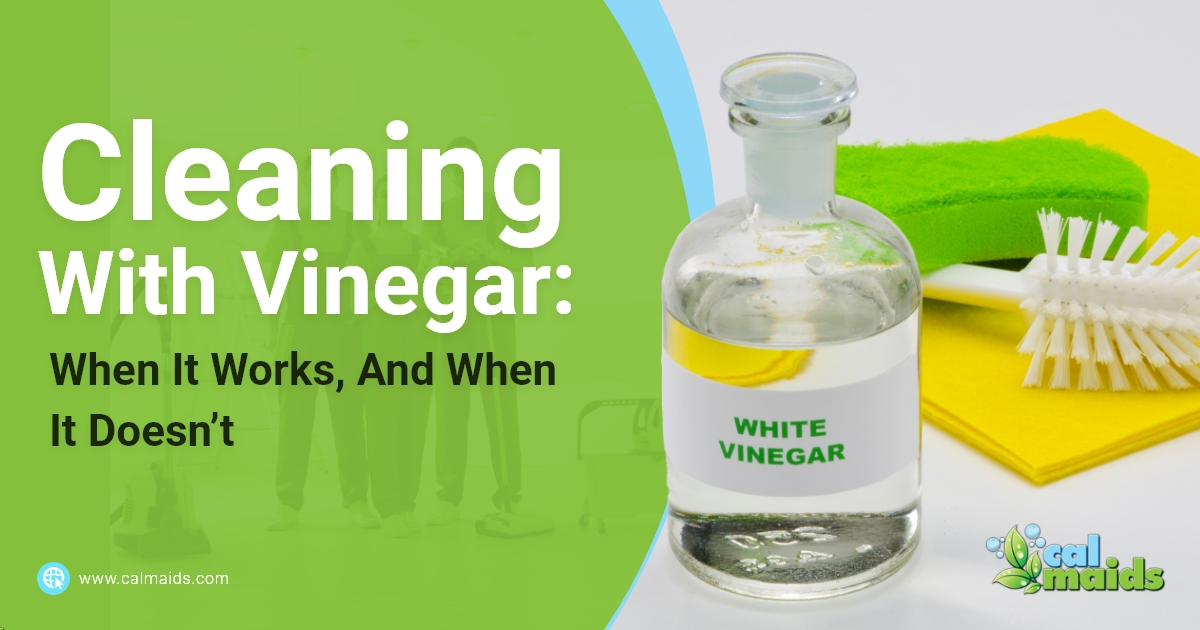Looking for the ultimate green cleaner? Before you reach for that bottle of vinegar, you might want to pause and read this captivating blog post. While vinegar has earned its reputation as a go-to green cleaner, it may not always be your best bet for tackling cleaning tasks.
Our top-rated cleaning company, we believe in sharing the truth about cleaning products. In this insightful article, we’ll unravel the mystery of vinegar’s effectiveness as a cleaner. Discover when vinegar truly shines in cleaning and when it’s wiser to leave it nestled in your pantry.
Learn here when vinegar works for cleaning and when it’s better to take it back to the pantry.
Why do people use vinegar as a cleaner?
The main use for vinegar is inside the kitchen—and not for cleaning! However, people (and cleaning companies) are always looking for less harsh ways to clean. Finding a gentle but effective cleaning product is a challenge, and that’s when vinegar comes in handy.
Acetic acid (vinegar’s main component) is acidic enough to cut through grease and dissolve some types of stains. It also works as a sanitizer, although not as effective. However, vinegar is safe to use as it won’t release toxic fumes or irritate your skin like other household cleaners.
When vinegar won’t work
If vinegar has so many benefits and is safe to use, why not use it as an all-purpose cleaner?
There are two reasons:
- The first one is plain and simple. Vinegar isn’t your best option for removing dirt nor for disinfecting. In other words, it’s not as effective to become your product of choice.
- The second reason is essential too. Vinegar might damage some surfaces inside your home!
Here are some situations when vinegar is not the best choice!
1. When mixed with soap
Soap and vinegar are common household cleaners, but they work in different ways. Vinegar is acidic, and soap is alkaline. If you mix vinegar and soap, you are balancing their pH. To simplify things, let’s just say that they are canceling each other—and reducing their cleaning power!
In the same way, you’ll get a flashy chemical reaction from mixing vinegar and baking soda, but nothing more. Baking soda is also alkaline!
However:
Soap and vinegar can be a cleaner combo. To make the most out of both products, use soap first, then vinegar. Rinsing with vinegar could work because it leaves less residue!
2. Cleaning appliances with rubber seals
Dishwashers could benefit from a vinegar wash to remove all the build-up minerals from hard water. However, rubber components (for example, the door gasket) may not benefit at all. Vinegar can eat up rubber if given enough time to react.
Of course, damages won’t happen overnight. Besides, some types of rubber react differently to vinegar. You may use vinegar, but make sure to follow the manufacturer’s guidelines!
3. Wiping stone fixtures and floors
Vinegar could etch or damage stone surfaces. Do you have granite countertops? Or maybe marble floors? Avoid using vinegar on them! Usually, manufacturers recommend a specific cleaner for stone fixtures and floors. Follow their guidelines to avoid unwanted damages!
4. As a disinfectant
Vinegar can kill some germs. However, when health is at risk, some is not enough. There are plenty of other cleaning products that work as a better disinfectant than vinegar. Stick to them!
When vinegar does work for your chores!
Vinegar isn’t the perfect cleaning product that some people claim. However, it doesn’t mean it has no use for your household chores. Diluted vinegar is the best option for cleaning soap scum, dissolving mineral deposits, and removing rust!
Learn more helpful cleaning tips with CalMaids!
Visit our blog page to hone your cleaning skills and learn some tricks from the best cleaning company in Silicon Valley!
CalMaids is an experienced cleaning company delivering quality home and commercial cleaning services. You can learn more about our services here.



